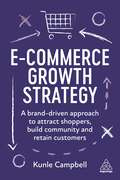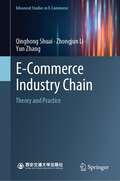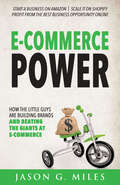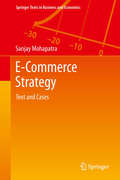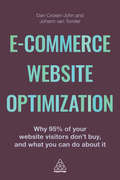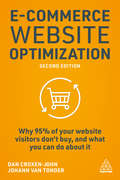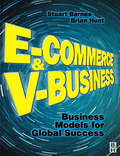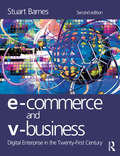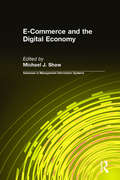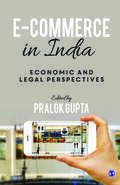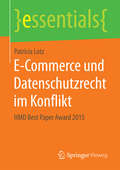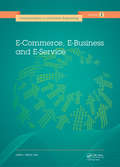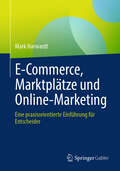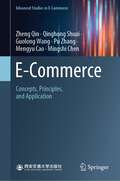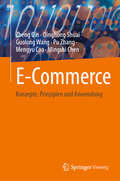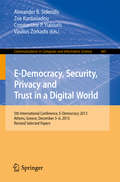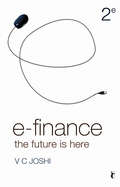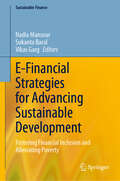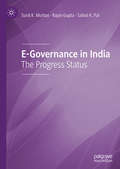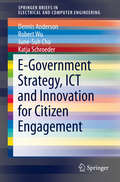- Table View
- List View
E-Commerce Growth Strategy: A Brand-Driven Approach to Attract Shoppers, Build Community and Retain Customers
by Kunle CampbellIncrease visibility, customer engagement and conversion rates with the ultimate blueprint for e-commerce growth.E-commerce Growth Strategy shares valuable insights and practical strategies to help businesses thrive in the rapidly accelerating e-commerce landscape. By connecting e-commerce tools and metrics to broader brand-building and marketing strategies, this book guides readers through essential areas such as customer-centricity, cross-functional collaboration, consumer data and behaviour, acquisition and retention strategies, community building, search engine marketing, paid social advertising, product development, alternative growth routes and tracking success.Written by an experienced e-commerce growth advisor and operator, E-commerce Growth Strategy features bullet-pointed chapter summaries, interviews with industry leaders, case studies and online toolkits. E-commerce Growth Strategy is a vital resource for brands seeking to methodically plan, execute, and manage their e-commerce growth plans.
E-Commerce Industry Chain: Theory and Practice (Advanced Studies in E-Commerce)
by Yun Zhang Zhongjun Li Qinghong ShuaiThis book focuses on e-commerce industry chain based on the whole process of e-commerce activities (production, distribution, circulation, consumption). It extracted the supporting technology and operation process of e-commerce into general principles in the form of mathematical analysis, helping readers to build the frame of theory and practice of activity link of e-commerce. This book stands on the concepts, carries on the innovation and cases in the practice, helping readers to establish a relatively complete e-commerce system. Also the arising challenges and issues are discussed, and guide for the future e-commerce development under the new situation is presented.
E-Commerce Power: How the Little Guys Are Building Brands and Beating the Giants at E-Commerce
by Jason G. MilesAn online marketing expert shares practical steps for starting and scaling your e-commerce brand—plus interviews with successful online entrepreneurs.In the age of Amazon, e-commerce is the name of the game. And over the past few years, the shift to online shopping has radically accelerated. If you don’t have an e-commerce business yet, it’s time to start one! If you already have one, it’s time to scale up. E-Commerce Power teaches you how to harness the power of the niche brand model. It is filled with useful knowledge and practical tips such as proven online marketing methods, management and goal-setting techniques, and advice on developing new products from brainstorm to launch and beyond. Plus informative interviews with entrepreneurs, including:Mike Brown, Death Wish Coffee Zac Martin, Yellow Hammer ToolsAlex Shirley-Smith, TentsileLisa and Jared Madsen, Madsen Cycles Ashley Turner, Farmbox Direct Cinnamon Miles, Pixie FaireDaniel Leake, Catfish SumoAtulya Bingham, The Mud Home
E-Commerce Strategy
by Sanjay MohapatraE-Commerce Strategy: Text and Cases provides the fundamental literature required for graduate students and practitioners to understand electronic commerce. Each chapter provides clearly designed learning objectives and review questions to highlight the major topics and goals. This book covers many of the new innovations and technologies that have been established for e-commerce site development. Unlike similar books, topics such as e-channel adoption, factors affecting e-commerce adoption, and strategy design are reviewed in greater depth. Additionally, the book examines areas not normally covered like open source, online research, and peer-to-peer systems. E-Commerce Strategy: Text and Cases is divided into two parts. Part 1 examines the evolution of e-commerce, analyzes different sectors such as B2B and m-Commerce, and explores the challenges they face. Case studies of well known companies reinforce the concepts learned to demonstrate both successes and failures in the field. Part 2 deals with developing strategies in e-Commerce and looks at future trends including Web 2.0. Overall, the useful guidelines provided should prove valuable to students and researchers in the field.
E-Commerce Trends in China: Social Commerce, Live-Streaming oder New Retail (essentials)
by Christina RichterE-Commerce hat einen langen Weg zurückgelegt – von Katalogen mit Bestellung per Fax hin zur Ein-Klick-Bestellung mit Lieferung am selben Tag. In China machen mobiles Konsumverhalten, der Wunsch nach Unterhaltung und eine omnipräsente Infrastruktur für mobiles Bezahlen den lokalen Einzelhandelsmarkt aus. Auch die Verknüpfung von Online und Offline gehört zum Alltag dazu und Social Commerce und Livestreaming sind heute die beste digitale Nachahmung des klassischen Stadtbummels. Und dabei sehr populär.
E-Commerce Website Optimization: Why 95% of Your Website Visitors Don't Buy, and What You Can Do About it
by Dan Croxen-John Johann Van TonderFor those running e-commerce websites there are three ways to increase sales: increasing the quantity of visitors; increasing the percentage of visitors who buy from the site; and increasing the amount that visitors spend when they buy. E-commerce Website Optimization goes beyond simply increasing traffic, helping readers to improve conversion rates, increase ROI from online marketing campaigns, and generate higher levels of repeat business. It brings together usability, analytics and persuasion to offer a straightforward and detailed 5-step methodology of how to use the tools and techniques of Conversion Rate Optimization (CRO) to increase the e-commerce value of websites. Grounded in the latest theory and research, this will help readers to be well-informed and confident to make the right choices.Backed up with a range of invaluable case studies, E-commerce Website Optimization is perfect for those seeking to implement a data-driven ethos to their organization's e-commerce programme, based on market-tested and robust split-test methodology used across a range of commercial businesses. It supports all those responsible for online sales within an organization, be they the Chief Digital Officer, Head of Online Sales or E-commerce; or entrepreneurs and owners of small businesses deriving a substantial proportion of revenue from e-commerce.
E-Commerce Website Optimization: Why 95% of Your Website Visitors Don't Buy, and What You Can Do About it
by Dan Croxen-John Johann van TonderConversion rate optimization (CRO) is a complex field and one that is rapidly evolving. It's about understanding people and their behaviour, not simply website visits. E-commerce Website Optimization provides an all-encompassing guide, explaining the how and why, before focusing on techniques and tools to increase the percentage of visitors who buy from the site, and subsequently the amount that these visitors spend when they buy. Grounded in best-practice theory and research, it brings together usability, analytics and persuasion to offer a detailed, step-by-step guide to improve conversion rates, increase ROI from online marketing campaigns, generate higher levels of repeat business and increase the e-commerce value of websites. In the fast-moving world of e-commerce, this fully revised second edition includes updates on test metrics, prioritization and personalization, as well as a new chapter on persuasive copywriting. Alongside updated case studies and newly recommended tools, E-commerce Website Optimization is an invaluable book for those seeking to implement a data-driven ethos for their organization's e-commerce programme, for everyone from chief digital officers and heads of online sales, to entrepreneurs and small business owners.
E-Commerce and V-Business
by Brian Hunt Stuart BarnesE-Commerce and V-Business examines the impact of the Internet and associated technologies on two related aspects of business: electronic commerce and virtual organisation. Using a combination of recent theory and empirical evidence it demonstrates how forward thinking organisations are reaping considerable strategic advantage from exciting new business models in these areas. Such models require radical rethinking of many aspects of traditional business. The book covers many of the critical and contemporary issues stemming from these important new developments.
E-Commerce and V-Business
by Stuart BarnesE-commerce and V-business examines the impact of the Internet and associated technologies on two related aspects of business: electronic commerce and virtual organization. Using a combination of recent theory and empirical evidence it demonstrates how forward thinking organizations are reaping considerable advantages from exciting new business models in these areas. Such models require radical rethinking of many aspects of traditional business. The book covers many of the critical and contemporary issues stemming from these important new developments. The collected papers in this book illustrate the wide variety of business opportunities afforded by e-commerce and virtual business. They describe and discuss the important issues that follow in the wake of an organization deciding to pursue consumers electronically and organize its operations virtually. It brings a good balance of theory and practical issues from different perspectives from different parts of the globe
E-Commerce and the Digital Economy (Advances In Management Information Systems Ser.)
by Michael J. ShawThis volume in the "Advances in Management Information Systems" series offers a state-of-the-art survey of information systems research on electronic commerce. Featuring chapters by leading scholars and industry professionals, it provides the framework for understanding the business trends, emerging opportunities, and barriers to overcome in the rapid developments taking place in electronic business and the digital economy. Researchers, students, and practitioners - anyone interested in the current issues and future direction of electronic commerce, especially from the standpoint of information systems and information technology - will find this book to be an authoritative source of cutting-edge information. The volume is divided into four parts: Part I covers the fundamental issues of information technology standards and the transformation of industry structure; Part II focuses on B2B commerce; Part III investigates the management of mobile and IT infrastructure; and Part IV includes trust, security, and legal issues that undergird the success of e-commerce initiatives.
E-Commerce für klein- und mittelständische Unternehmen
by Yannik SüssIn zehn Kapiteln vermittelt dieses Fachbuch den Weg zu einem erfolgreichen Onlineshop. Ausgehend von einem schlüssigen Konzept, über die Auswahl der Technologie und Fragen der Usability sowie rechtliche Aspekte und die praktische Umsetzung werden auch Themen wie Versandabwicklung oder Suchmaschinenoptimierung behandelt. Hierfür wird auf jeden Schritt umfassend eingegangen, um so ein tiefes Bewusstsein für Anforderungen und notwendige Durchführungsschritte zu generieren. Der Autor stellt dabei den neuen Wachstumsmarkt E-Commerce vor.
E-Commerce für kleine und mittelständische Unternehmen: Konkrete Schritte zum digitalen Erfolg
by Yannik SüßIn zehn Kapiteln vermittelt dieses Fachbuch den Weg zu einem Onlineshop und der Autor stellt den Wachstumsmarkt E-Commerce vor.Neben der Entwicklung eines schlüssigen Konzepts, der Auswahl der Technologie, Klärung der Fragen zur Usability und zur Rechtsgrundlage, wird auch die praktische Umsetzung wie Versandabwicklung oder Marketing behandelt. Dabei wird auf jeden Schritt umfassend eingegangen, um so ein tiefes Bewusstsein für Anforderungen und notwendige Durchführungsschritte zu schaffen.
E-Commerce in India: Economic and Legal Perspectives
by Pralok GuptaE -commerce is growing at an exponential rate in India. Despite this, it is still at an evolving stage as economic and regulatory frameworks pertaining to various segments of e-commerce are being put into place by the government. This book presents a comprehensive analysis of the economic and regulatory aspects of the e-commerce sector by assessing the trends and characteristics, and addressing the issues and challenges associated with it. It dwells into key issues including FDI regulations, taxation, valuation of e-commerce companies, market structure, competition, payment mechanism, blockchain and cryptocurrencies, and logistics. The issues and challenges addressed in this book frequently appear as discussion points in policy debates, research forums and popular media. However, information on these is scant and often scattered. This book bridges gaps in the available literature on e-commerce
E-Commerce und Datenschutzrecht im Konflikt: HMD Best Paper Award 2015 (essentials)
by Patricia LotzPatricia Lotz behandelt Rechtsfragen zum Einsatz moderner Marketingformen und gibt einen ersten #65533;berblick #65533;ber die Fallstricke, die sich dem E-Commerce in Zukunft vor allem im Bereich des Datenschutzes stellen werden. Die Autorin zeigt gleichzeitig m#65533;gliche L#65533;sungswege auf. Aus rechtlicher Sicht bespricht sie Webtracking, Geolokalisierung und Social Plugins. Zudem gibt sie eine #65533;bersicht #65533;ber die Integration von E-Payment-L#65533;sungen.
E-Commerce, E-Business and E-Service (Communications in Information Engineering)
by Garry LeeThe 2014 International Conference on E-Commerce, E-Business and E-Service (EEE 2014) was held on May 1-2, 2014, Hong Kong. This proceedings volume assembles papers from various professionals, leading researchers, engineers, scientists and students and presents innovative ideas and research results focused on the progress of E-Commerce, E-Business a
E-Commerce, Marktplätze und Online-Marketing: Eine praxisorientierte Einführung für Entscheider
by Mark HarwardtDas Buch zeigt die dynamischen und vielschichtigen Welten des E-Commerce, der elektronischen Marktplätze und des Online-Marketings auf - Themen, die in unserer zunehmend digitalisierten Welt von zentraler Bedeutung sind. Denn E-Commerce hat sich von einem Nischenmarkt zu einem globalen Phänomen entwickelt, das die Art und Weise, wie wir kaufen und verkaufen, grundlegend verändert hat. Der Autor stellt die theoretischen Aspekte von E-Business, E-Commerce, Marktplätzen, Online-Marketing sowie die rechtlichen Rahmenbedingungen vor und gibt insbesondere Einblicke in die Praxis. Das Ziel dieses Buches ist es die grundlegenden Begriffe und Zusammenhänge von E-Commerce und Online-Marketing zu erklären, sodass die gewonnenen Erkenntnisse direkt in die berufliche Praxis integriert werden können.
E-Commerce: Concepts, Principles, and Application (Advanced Studies in E-Commerce)
by Zheng Qin Guolong Wang Qinghong Shuai Pu Zhang Mengyu Cao Mingshi ChenThis book mainly discusses the background of e-commerce, the basic knowledge of e-commerce, the basic models of e-commerce, the basic principles of e-commerce and the cases of e-commerce. This book has formed a theoretical system of e-commerce with a clear integration boundary. The introduction of the systematic theory is guided by the background of e-commerce, centered on the model of e-commerce, paved with the principles of e-commerce and integrated with the cutting-edge cases. This book defines the basic concepts, models and principle of e-commerce in the form of mathematical analysis and analyzes the basic theory of e-commerce from the perspective of mathematical model. This enables readers to form an abstract understanding of the connotation and extension of e-commerce. It establishes a knowledge system with the background of social ecology, engineering ecology and innovative ecology, taking the models of e-commerce as the core, the principles of e-commerce as the process, the architecture of e-commerce as the platform and the operation and management of e-commerce as the means to integrate the knowledge into application. This book uses case study to comprehensively analyze and apply the knowledge system involved in e-commerce, combining theoretical research with engineering research. Through this book, readers can systematically master all kinds of theories involved in e-commerce. This book aims at different professional and diverse reader groups. It can be used as the basic books for students of various e-commerce-related specialties.
E-Commerce: Konzepte, Prinzipien und Anwendung
by Zheng Qin Guolong Wang Qinghong Shuai Pu Zhang Mengyu Cao Mingshi ChenDieses Buch behandelt hauptsächlich den Hintergrund des E-Commerce, das Grundwissen des E-Commerce, die Grundmodelle des E-Commerce, die Grundprinzipien des E-Commerce und die Fälle des E-Commerce. Dieses Buch hat ein theoretisches System des E-Commerce mit klaren Integrationsgrenzen gebildet. Die Einführung der systematischen Theorie wird durch den Hintergrund des E-Commerce geleitet, zentriert sich auf das Modell des E-Commerce, wird mit den Prinzipien des E-Commerce untermauert und mit den neuesten Fällen integriert. Dieses Buch definiert die grundlegenden Konzepte, Modelle und Prinzipien des E-Commerce in Form einer mathematischen Analyse und analysiert die Grundtheorie des E-Commerce aus der Perspektive des mathematischen Modells. Dies ermöglicht den Lesern, ein abstraktes Verständnis der Konnotation und Erweiterung des E-Commerce zu entwickeln. Es etabliert ein Wissenssystem mit dem Hintergrund der sozialen Ökologie, der Ingenieurökologie und der Innovationsökologie, wobei die Modelle des E-Commerce als Kern, die Prinzipien des E-Commerce als Prozess, die Architektur des E-Commerce als Plattform und der Betrieb und das Management des E-Commerce als Mittel zur Integration des Wissens in die Anwendung dienen. Dieses Buch verwendet Fallstudien, um das Wissenssystem, das den E-Commerce betrifft, umfassend zu analysieren und anzuwenden und kombiniert theoretische Forschung mit Ingenieurforschung. Durch dieses Buch können die Leser systematisch alle Arten von Theorien, die den E-Commerce betreffen, meistern. Dieses Buch richtet sich an verschiedene professionelle und diverse Lesergruppen. Es kann als Grundlagenbuch für Studenten verschiedener E-Commerce-bezogener Fachrichtungen verwendet werden.
E-Democracy, Security, Privacy and Trust in a Digital World: 5th International Conference, E-Democracy 2013, Athens, Greece, December 5-6, 2013, Revised Selected Papers (Communications in Computer and Information Science #441)
by Alexander B. Sideridis, Zoe Kardasiadou, Constantine P. Yialouris and Vasilios ZorkadisThis book constitutes the thoroughly refereed post-conference proceedings of the 5th International Conference on Security, Privacy and Trust in a Digital World, e-Democracy 2013, held in Athens, Greece, December 2013. The 20 revised full papers presented were carefully selected from numerous submissions. The papers are organized in topical sections on security, privacy; e-governance; e-government applications, virtualizations; politics, legislation: European initiatives.
E-Discovery and the Federal Rules of Civil Procedure: A Pocket Guide
by Bradley J SchaufenbuelAre you aware how the Federal Rules of Civil Procedure might affect your organization? According to a recent survey of corporate attorneys by Pike and Fischer, only 7% of respondents feel that their companies are ready to meet the E-Discovery requirements of the recently updated Federal Rules of Civil Procedure (FRCP). Given that ESG Research estimates that 91% of organizations with a workforce over 20,000 employees have been through an electronic discovery event in the past twelve months, this statistic is truly astounding. The pitfalls involved with E-Discovery represent one of the greatest risks that organizations face in litigation today. This ITG Pocket Guide describes the FRCP and the recent changes made to it, explores the implications of these changes for the enterprise (with a focus on IT), and lays out a framework for identifying, assessing and then addressing the risks associated with the facilitation of E-Discovery requests under the new rules.
E-FOOD: Closing the Online Enforcement Gap in the EU Platform Economy (Studies in European Economic Law and Regulation #21)
by Maria Jose Plana CasadoRetail is ‘going digital,’ and grocery shopping is no exception. While some businesses are relaying on their corporate website to make the sale, both traditional brick-and-mortar and new disruptive business models are increasingly using online marketplaces to offer their products online. European Union law has been gradually updated to reflect this new reality, with Intellectual Property Rights legislation and Consumer Law leading the way toward a suitable regulatory framework in the Platform Economy. However, the EU has not devised a comprehensive strategy for tackling the challenges posed by the online sale of physical consumer goods, such as effective public enforcement in online environments. In fact, sector-specific legislation, including Food Law, largely ignores online transactions. In this context, the book evaluates the impact that online marketplaces are having on European Union sector-specific legislation and its e-nforcement. The goal is to assess whether the existing regulatory and policy framework are sufficient for promoting compliance and bridging the enforcement gap in the digital single market. Focusing on the e-food market, the book presents a state-of-the-art overview of how online marketplaces are altering EU law and its enforcement by public authorities.
E-Finance: The Future is Here (Response Books)
by Vasant C JoshiE-Finance: The Future is Here exhorts the Indian banks to use their post crisis advantages like safe and sound business practices, technology competence and lower costs to attract business from overseas customers. ‘The Future is Here,’ avers V C Joshi and suggests that financial institutions could effectively use their branch network to market e-services. This concise yet comprehensive book talks about not only the planning aspect, but also the process of e-banking; it discusses the internet business model that these banks can adhere to and examines the working of e-banking, e-insurance and e-broking, and so on. The developments in alternate systems of trading in areas like treasuries and foreign exchange are also discussed in great detail. The author oversteps the Indian periphery and takes on a global approach. The security aspects discussed exhaustively and the author highlights the difficulties in enforcing claims through the judicial process. This book is enriched with recent examples and will be very useful for professionals in the banking, insurance and financial sectors, as also to management students and the general reader. Since it touches upon the implementation aspects of e-finance, it would also be of immense help to practising executives.
E-Financial Strategies for Advancing Sustainable Development: Fostering Financial Inclusion and Alleviating Poverty (Sustainable Finance)
by Vikas Garg Nadia Mansour Sukanta BaralThis book offers insights how to foster financial inclusion and combat poverty in alignment with the first UN Sustainable Development Goal (SDG), which pledges ‘No Poverty’. From describing and analysing e-financial tools to providing tailored strategies for financial inclusion, this book equips readers with actionable knowledge to drive positive change. The contributions explore the synergy between cutting-edge digital finance with all the newest technological innovations and the pursuit of a poverty-free world. Readers will learn how to implement e-financial strategies for sustainable economic growth and social progress. The book is a must-read for policymakers, economists, and anyone dedicated to shaping a better future for all.
E-Governance in India: The Progress Status
by Sunil K. Muttoo Rajan Gupta Saibal K. PalThe book discusses the concepts of E-Governance from the understanding of a naïve user. While providing introduction to the concept, it shows the status of E-Governance in India through various measures, and its progress through different case studies. The historical development of E-Governance around the world and its rise in few developed and developing nations have also been discussed. The book also elaborates the establishment of E-Governance in India in detail and then compares the progress in Indian states through different measures and metrics. The structure of the E-Governance in India has been explained, including the explanation of the details related to National E-Governance Plan. The book is a combination of theoretical and practical concepts defined over various aspects of E-Governance in India. This book serves as the first stage reading material for any individual working in the Indian region on E-Governance.
E-Government Strategy, ICT and Innovation for Citizen Engagement
by Dennis Anderson Robert Wu June-Suh Cho Katja SchroederThis book discusses three levels of e-government and national strategies to reach a citizen-centric participatory e-government, and examines how disruptive technologies help shape the future of e-government. The authors examine how e-government can facilitate a symbiotic relationship between the government and its citizens. ICTs aid this relationship and promote transparencies so that citizens can place greater trust in the activities of their government. If a government can manage resources more effectively by better understanding the needs of its citizens, it can create a sustainable environment for citizens. Having a national strategy on ICT in government and e-government can significantly reduce government waste, corruption, and inefficiency. Businesses, CIOs and CTOs in the public sector interested in meeting sustainability requirements will find this book useful.
